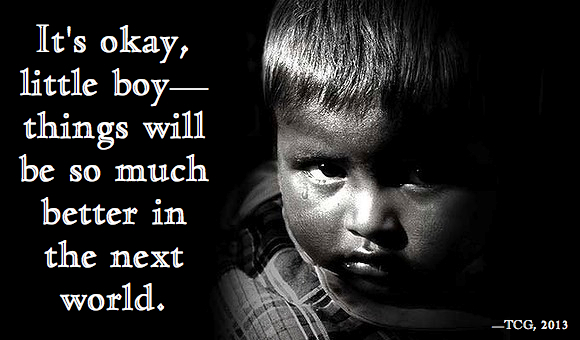 KARL MARX—Outline/Handout KARL MARX—Outline/Handout  | |||
|---|---|---|---|
• I. Dialectical Materialism: Hegelian dialectics meets the history of socio-economics (and materialism): In Marx, Hegel's "spiritual dialectic (development of consciousness) has been replaced by a materialist dialectic (changes in modes of production and exchange)" (Jones 187). | |||
| And again: "For Hegel, ideas were the generating causes of all other changes. . . . For Marx, ideas and theories were not causes but epiphenomena, passive by-products of the economic forces that are the real determinants of change. From this ideological way of thinking about theory, it is fair to say that theory has never quite recovered" (Jones 188). (Thus the contemporary Marxist Terry Eagleton can maintain—as we have seen—that all discourse—incl. "literature"—is ultimately political, ideological—issuing at last from a material base.) | |||
| But/so some Hegel-esque triads (and lots of dialectical "struggle"!); e.g.: | |||
| * feudalism -> capitalism -> communism . . . (Also very Hegelian is Marx's idea that each socio-economic moment includes "the germs of its own destruction" [see Marx and Engels 614A].) | |||
| * capitalists (bourgeoisie) vs. the proletariat => classless society (the "rule of the proletariat," a Marxist utopia) | |||
| • Marx's buddy Engels (and his italics!): "The contradiction between socialized production and capitalistic appropriation manifested itself as the antagonism of proletariat and bourgeoisie" (Socialism: Utopian and Scientific; qtd. in Jones 182). | |||
| • "Marx fitted his philosophy of history into a mould suggested by Hegelian dialectic, but in fact there was only one triad that concerned him: feudalism, represented by the landowner; capitalism, represented by the industrial employer; and Socialism, represented by the wage-earner" (Russell 788). | |||
• II. Base & Superstructure | |||
| A. The BASE: from Engel's 1888 preface to the Communist Manifesto: Marx's "fundamental proposition" is that, "in every historical epoch, the prevailing mode of economic production and exchange, and the social organization necessarily following from it, form the basis upon which is built up, and from which alone can be explained the political and intellectual history of that epoch [this is the base, in contrast to the superstructure]; that consequently the whole history of mankind (since the dissolution of primitive tribal society, holding land in common ownership) has been a history of class struggles, contests between exploiting and exploited, ruling and oppressed classes; That the history of these class struggles forms a series of evolutions in which, nowadays, a stage has been reached where the exploited and oppressed class—the proletariat—cannot attain its emancipation from the sway of the exploiting and ruling class—the bourgeoisie—without, at the same time, and once and for all, emancipating society at large from all exploitation, oppression, class distinction, and class struggles." | |||
| B. The SUPERSTRUCTURE: "The mode of production in material life determines the general character of the social, political and intellectual processes of life. It is not the consciousness of men that determines their existence, but, on the contrary, their social existence determines their consciousness. . . . With [any] change of the economic foundation the entire immense superstructure is more or less rapidly transformed. In considering such transformations the distinction should always be made between the material transformation of the economic conditions of production [the base], which can be determined with the precision of natural science, and the legal, political, religious, aesthetic or philosophic—in short, ideological forms [of the superstructure] in which men become conscious of this conflict and fight it out" (Marx 616A]). | |||
| —Even "alterations in esthetic and literary taste, in philosophical theory, and indeed in every department of life reflect . . . underlying economic changes" (Jones 184). (Thus the Marxist theory that the superstructure is only a reflection of the base came to be known as reflection theory.) . . . And more: "What else does the history of ideas prove than that intellectual production changes its character in proportion as material production is changed? The ruling ideas of each age have ever been the ideas of its ruling class" (later in the Communist Manifesto; qtd. in Jones 184)—that is, the capitalists/bourgeoisie shape and control the superstructure. | |||
• III. The Materialism | |||
| However, versus Hegel, Marx denied metaphysics and idealism; there is nothing but the physics of human material existence: (to repeat the quot. above,) "It is not the consciousness of men that determines their being [which = idealism], but, on the contrary, their [material,] social being that determines their consciousness"—especially the economic "mode of production" (economic system) in which they live. The human self or consciousness and all its thoughts and values are mere epiphenomena of sheer material reality. | |||
| —And so "man's ideas, views, and conceptions, in one word, man's consciousness, changes with every change in the conditions of his material existence, in his social relations and in his social life" (later in the Communist Manifesto; qtd. in Jones 184). | |||
| —"For Marx, reality was coextensive with Kant's spatiotemporal manifold: There is no transcendent realm beyond the world encountered in experience. Theology and metaphysics . . . are only ideologies, by-products of social forces and thus without cognitive reference" (Jones 178). | |||
| This anti-idealism extends to a critique of RELIGION: "Religion is the sigh of the oppressed creature, the heart of the heartless world, just as it is the spirit of a spiritless situation. It is the opium of the people." (And thus a later Marxist, John Lennon, could sing, "Imagine there's no heaven.") . . . As a major part of the superstructure—and of what the Marxist Althusser will eventually call the Ideological State Apparatuses—"Religion functions as a police force, as a bourgeois technique to dissuade the masses from revolting by promising them a better happier existence after death than their exploiters allow them to enjoy during their lifetime on earth" (Sahakian 251). | |||
 | |||
| —Marx himself now, from "Contributions to the Critique of Hegel's Philosophy of Right": "Man makes religion; religion does not make man. Religion is, indeed, man's self-consciousness and self-awarenessof so long as he has not found himself . . . . The abolition of religion as the illusory happiness of men, is a demand for their real happiness" (qtd. in Jones 188). | |||
| —The proletariat will come to "realize that the old sanctions of law, morality, and religion, which formerly reconciled them to their lot, are" merely the lies of the bourgeoisie to maintain their power (Jones 186; see also Marx and Engels 613). | |||
• The most famous Marxist lyric of all time?:
| |||
| In contrast to false ideologies, Marx saw his philosophy as science: "Marx, like Bentham and James Mill, will have nothing to do with romanticism; it is always his intention to be scientific" (Russell 783). (This is another contrast with Hegel, whose absolute holism is ultimately a Romantic—even mystical—gesture?) | |||
| Versus most philosophers in the Western tradition, Marx is (obviously) all about politics & praxis: "Philosophers have only interpreted the world in various ways, but the real task is to alter it" (Eleven Theses on Feuerbach; qtd. in Russell 784). | |||
•IV. Alienation | |||
| "Increasingly . . . in the course of the nineteenth century alienation came to be regarded as an inevitable part of the human condition. . . . [A]s the nineteenth century advanced, man came to feel more and more alone and a stranger in the world. Urbanization, with the anonymity it entails; the rootlessness of modern life; mass production, with its separation of the producer from the product and from any sense of fulfillment . . . and above all, perhaps, an increasingly secularist attitude that seemed to leave no place for God or gods—all these factors contributed to man's feeling of alienation" (Jones 179). | |||
| —False consciousness is a related (if somewhat converse) term, the proletariats' usual belief that society is "natural" and as it should be, that the capitalist system is going swimmingly, that they are happy in their assigned lots as cogs in the machine—until they awakened by Marxist revolutionary thought to "rage against the machine" because of a newfound consciousness of their very alienation. | |||
• V. (More) Critiques of Marx | |||
| One common critique of Marxism is that its optimistic eschatology for this world—its prophecy of a "heaven on earth"—remains something of a displaced (but still quite millennialist) religion. Indeed, "Marx professed himself an atheist, but retained a cosmic optimism which only theism could justify" (Russell 788-789). (This reading of Marx can even be found in such 20th-century neo-Marxists as Jean Baudrillard.) | |||
| Russell even resorts to some Nietzschean psycho-historical perspectivism to attack Marx: "Marx . . . believes in the truth of his own doctrines; he does not regard them as nothing but an expression of the feelings natural to a rebellious middle-class German Jew in the middle of the nineteenth century" (785). (Now—apply a similar critique to Russell, as an English Gentile from the British Empirical tradition writing in the middle of the 20th century?!) | |||
| Marxism is so monolithic, at last, in finding economics to be the base of everything, and economic class to be the crux of social oppression, historical evolution, et al. Is the economic system the main (even sole) determinant of humankind's works of art & intellect, etc.? Are not gender oppression, racism, etc., also major loci of social injustice? (Recall Eagleton's rather sour-grapes treatment of the ascendancy of feminist criticism and the advent of postcolonial theory!) | |||
Engels, Friedrich. "Manifesto of the Communist Party: Preface." 1888. Marxists Internet Archive, https://www.marxists.org/archive/marx/works/1848/communist-manifesto/preface.htm. | |||
Jones, W. T. Kant and the Nineteenth Century. 2nd rev. ed., Harcourt Brace Jovanovich, 1975. | |||
Marx, Karl. "[From] A Contribution to the Critique of Political Economy." 1859. Critical Theory Since Plato. Edited by Hazard Adams and Leroy Searle, 3rd ed., Thomson Wadsworth, 2005, pp. 615-616. | |||
Marx, Karl, and Friedrich Engels. "[From] Manifesto of the Communist Party." 1848. Critical Theory Since Plato. Edited by Hazard Adams and Leroy Searle, 3rd ed., Thomson Wadsworth, 2005, pp. 609-614. | |||
Russell, Bertrand. A History of Western Philosophy. Simon and Schuster, 1945. | |||
Sahakian, William S. History of Philosophy: From the Earliest Times to the Present. Barnes & Noble, 1968. | |||
| —TCG, August 2016; September 2018 | |||
